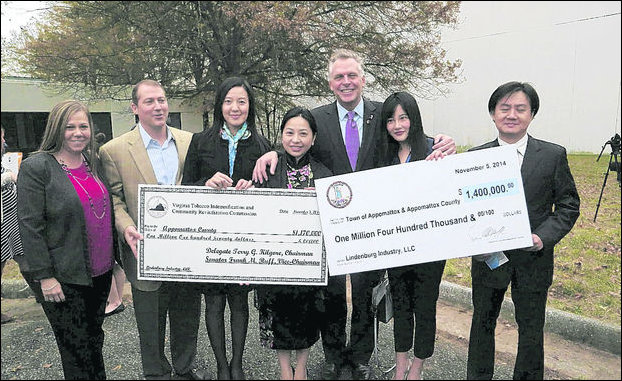by James A. Bacon
On Nov. 5, 2104, the McAuliffe administration announced that Lindenburg Industry, LLC, a Chinese corporation, would invest $113 million to rehab an old furniture factory in Appomattox County into an industrial-honeycomb manufacturing operation — the first new corporate announcement for the economically depressed Southside county in 15 years. The deal, crowed the press release, “is a direct result of the Governor’s meeting with company officials in Beijing, China during his Asia Marketing Mission last month.”
Governor Terry McAuliffe and local economic development officials posed with Anyuan Zhu and Yunshan “Stella” Li to present a$1.4 million check from the Governor’s Opportunity Fund to seal the deal.
Just one problem. While Lindenburg did purchase the old factory property, it never upgraded the facility, it never hired an employee, it fell behind in taxes and water service fees, and it accumulated unpaid bills of $450,00, reports the Roanoke Times. The state is demanding repayment of the $1.4 million, but Lindenburg officials, having returned to China, are stalling.
Virginia’s economic development apparatus has a strong reputation for professionalism, and its track record with the Governor’s Opportunity Fund has been overwhelmingly positive, but in this particular case, it stumbled badly. In a devastating article, reporter Jeff Sturgeon details how state and local officials failed to conduct the most elementary due diligence.
Among Sturgeon’s astonishing findings:
- State analysts relied on a company website produced in China featuring misleading information, including the listing of a North Carolina address where the company never was located and production photographs and text lifted from an unaffiliated American company.
- Text similar to material on the website appeared in a pre-approval request to the state commerce secretary and a briefing for the governor before his meeting in Beijing with a project principal.
- Officials also relied on a site consultant who vouched for the company but hadn’t asked basic background questions, such as the company’s address in China, until shortly before the deal was closed.
- Approached by the same players in 2013, North Carolina officials made checks and asked questions that Virginia officials did not.
- Only after the project appeared to stall did Virginia officials ask for company financial statements
The article backs up these conclusions with excellent reporting. Read it and weep.
As for the administration’s claim that the deal was “a direct result of the Governor’s meeting with company officials in Beijing, China,” Sturgeon provides a fascinating back story. As the deal was nearing completion, McAuliffe went on a trade mission to China, and his operatives tried to set up a meeting with Li at a Virginia-sponsored tourism event in Beijing.
When Li walked into the Beijing reception, the seller of the Appomattox plant still did not have his money, email traffic showed. A short time later, partnership officials who were closely monitoring their phones received an email from China saying that, according to a representative of Development Advisors also attending the event, a deposit of $1 million was “ready” and the rest would be “cleared” in a few days.
To credit McAuliffe back in 2014 with sealing the deal was ludicrous. Ultimately, Lindenburg did cough up $2 million in cash to take possession of the Appomattox furniture plant, and an unidentified Chinese bank did issue a $1 million letter of credit on Lindenburg’s behalf to guarantee an incentives payment expected from the Virginia Tobacco Commission. Those developments gave the Virginia Economic Development Partnership (VEDP) “comfort to move forward.”
Secretary of Commerce Maurice Jones told the Roanoke Times that the administration has learned from the fiasco. He has ordered the VEDP to conduct more thorough background checks, relying less upon website content and more upon audited financial statements.
Bacon’s bottom line: In terms of monumental screw-ups, the Appomattox industrial-honeycomb deal is small potatoes compared to the McDonnell administration’s $250 million U.S. 460 fiasco. But the incompetence is mind-boggling. Indeed, the incident raises questions of how sloppy the work has been on other economic-development deals, and makes one wonder if Lindenburg is a fluke or just one of many projects that were hastily pushed through.
McAuliffe routinely touts his success in economic development. He’s the deal-meister. He gets things done. And others are buying the narrative. Even John Sherman Jr., Republican-leaning former CEO of Scott & Stringfellow, noted in column lauding McAuliffe’s economic-development performance in the Richmond Times-Dispatch Sunday: “The economic numbers speak for themselves: 88,000 new jobs created, $9 billion in new investment in the commonwealth and unemployment at a record low 4.2 percent.”
Does the governor’s office pressure economic development officials to generate positive numbers by pushing through deals of dubious value? When North Carolina officials started asking basic questions, Zhu and Li lost interest in the Tarheel state. They moved on to Virginia. Virginia officials failed to exercise the same elementary due diligence. Has such lassitude long been standard practice — or have standards buckled under pressure to do deals?
(The line in the governor’s press release that “Virginia successfully competed against North Carolina for the project” is laughable. Judging by Sturgeon’s story, North Carolina never seriously competed for the deal.)
At the very least, reporters, bloggers and other observers need to apply a more skeptical eye to the fluffery contained in economic-development press releases, which for years have been geared to glorifying the role of whichever governor happened to be in power. Meanwhile, cross your fingers and hope there aren’t any more cases like this waiting to explode.



